

A galaxy within us: Our gut microbiota and how it can be programmed by food. Who would have thought that the human body contains over 10 times the amount of bacterial cells as human cells?
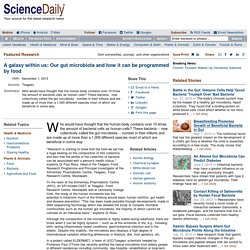
These bacteria -- now collectively called the gut microbiota -- number in their trillions and are made up of more than a 1,000 different species most of which are beneficial in some way. "Research is starting to show that the food we eat has a huge bearing on the composition of this collective and also that the profile of the collection of bacteria can be associated with a person's health status," explains Dr Paul Ross, Head of the Teagasc Food Research Programme and Principal Investigator at the Alimentary Pharmabiotic Centre, Teagasc, Food Research Centre, Moorepark. Although the composition of the microbiota is highly stable during adulthood, there are times when it can be highly dynamic -- such as at the extremes of life, e.g., following birth, during inflammatory bowel conditions, gastrointestinal infection and in the elderly.
Effects of antibiotics on gut flora analyzed. A study co-led by researchers at the Universitat de València reveals that antibiotics produce changes in the microbial and metabolic patterns of the gut.
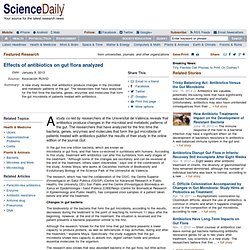
Intestinal bacteria influence food transit through the gut. Food transit through the small intestine affects the body's absorption of nutrients and, consequently, our health.
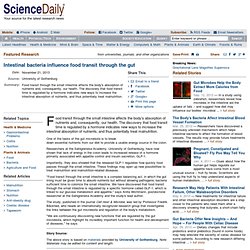
The discovery that food transit time is regulated by a hormone indicates new ways to increase the intestinal absorption of nutrients, and thus potentially treat malnutrition. One of the tasks of the gut microbiota is to break down essential nutrients from our diet to provide a usable energy source in the colon. Researchers at the Sahlgrenska Academy, University of Gothenburg, have now shown that lack of energy in the colon leads to increased release of a hormone primarily associated with appetite control and insulin secretion, GLP-1. Importantly, they also showed that the released GLP-1 regulates how quickly food passes through the small intestine. These findings may open up new possibilities to treat malnutrition and malnutrition-related diseases. Probiotics reduce stress-induced intestinal flare-ups, study finds. For those with irritable bowel syndrome who wonder if stress aggravates their intestinal disorder, a new University of Michigan Health System study shows it's not all in their head.
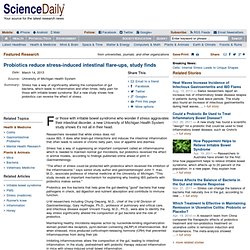
Researchers revealed that while stress does not cause IBS, it does alter brain-gut interactions and induces the intestinal inflammation that often leads to severe or chronic belly pain, loss of appetite and diarrhea. Stress has a way of suppressing an important component called an inflammasome which is needed to maintain normal gut microbiota, but probiotics reversed the effect in animal models, according to findings published online ahead of print in Gastroenterology. How antibiotic treatments impact on the development of resistant bacteria. Leon Cantas' doctoral research shows that the immune response of the host to a bacterial infection may have a significant effect on the development of bacteria's resistance to antibiotics.
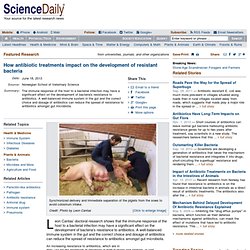
A well-balanced immune system in the gut and the correct choice and dosage of antibiotics can reduce the spread of resistance to antibiotics amongst gut microbiota. An increasing resistance to antibiotics, which are in daily use for the treatment of infections in both humans and animals, is well documented. Many bacteria have become resistant to several types of antibiotics and there are hardly any new antibiotics available to combat multiresistant bacteria of this kind. It is important to make sure that antibiotics continue to be an effective treatment for the generations to come, but incorrect and excessive use of antibiotics can increase the occurrence of resistant microorganisms. Human genes influence gut microbial composition, study suggests. Fecal transplant: Microbial restoration of the inflamed gut.
A team led by gastroenterologists Sieglinde Angelberger and Walter Reinisch (Medical University Vienna) and microbiologists David Berry and Alexander Loy (University of Vienna) explored how a treatment called "fecal microbiota transplantation" can be used to support microbial recolonization of the gut of patients with chronic intestinal inflammation (ulcerative colitis).
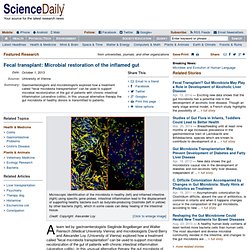
In this unusual alternative therapy the gut microbiota of healthy donors is transmitted to patients. The results of this pilot clinical study appear in the scientific journal American Journal of Gastroenterology. About two million people in Europe suffer from chronic inflammatory bowel diseases, which are characterized by progressive tissue destruction and that often necessitate removal of sections of the intestine. The exact causes of Crohn's disease and ulcerative colitis, the most common forms of these diseases, are still largely unknown. Fecal transplantation: an alternative therapy with a certain "yuck" factor.
Human gut microbes alter mouse metabolism, depending on diet. Germ-free mice that received gut bacteria from obese humans put on more weight and accumulated more fat than mice that were given bacteria from the guts of lean humans, according to a new study.
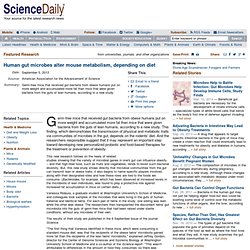
This finding, which demonstrates the transmission of physical and metabolic traits via communities of microbes in the gut, depends on the rodents' diet. And the researchers responsible suggest that it may represent an important step toward developing new personalized probiotic and food-based therapies for the treatment or prevention of obesity. This new research follows on the heels of related studies showing that the variety of microbial genes in one's gut can influence obesity -- and that high-fiber food, such as fruits and vegetables, tends to boost such bacterial diversity. Human gut microbes alter mouse metabolism, depending on diet.